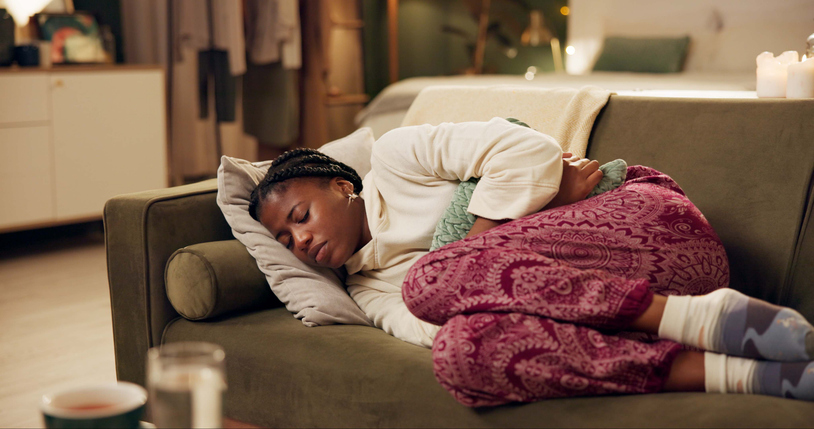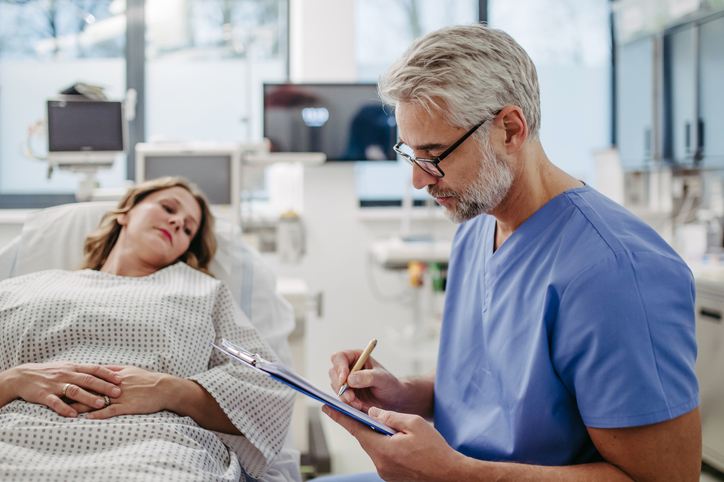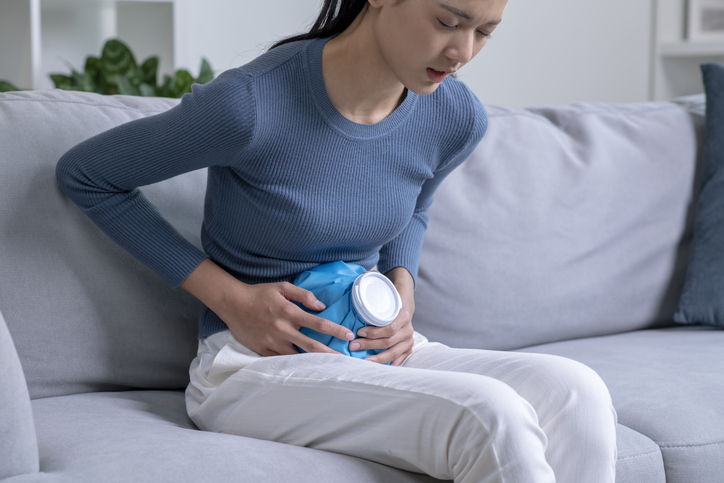Although endometriosis is a condition that begins in the reproductive organs, there are cases where these painful tissue growths appear in the bowels, also known as our digestive system, causing a whole slew of additional health problems.
Here's the quick and dirty definition of endometriosis: This condition occurs when the tissue that normally lines the uterus grows outside the uterus, with this abnormal tissue often affecting the ovaries and fallopian tubes as well. Symptoms include painful periods, pain during sex, excessive bleeding, and infertility.
But what happens when endometriosis spreads to the digestive system? In addition to “regular” endometriosis symptoms, bowel endometriosis patients like Annie Kuo, DO, a 44-year-old Los Angeles-based physician, have experienced “severe and persistent bloating and discomfort in the abdomen, pain in the lower back, constipation, and painful bowel movements.”
Information about endometriosis is usually restricted to the reproductive organs (because that’s where endo starts), but understanding bowel endometriosis is just as critical. Endometriosis can affect the bowel in 3% to 37% of all endo cases, with 90% of these cases involving the rectum or sigmoid colon (the last part of the colon). Rescripted spoke with Dorothy Bestoyong, DO, an OB/GYN based in Orlando, Florida, to learn more about the diagnosis and treatment of bowel endometriosis.

What is bowel endometriosis?
Bowel endometriosis occurs “when there are endometriosis implants on the bowels, particularly on the colon [aka the large intestine],” says Dr. Bestoyong. She identifies common symptoms as dyschezia, or painful bowel movements, rectal pain, changes in stool pattern (e.g. diarrhea and/or constipation), and bowel spasms. Dr. Bestoyong also confirms that, as with “regular” endometriosis, “symptoms typically worsen during menstruation.”
Is there a correlation between bowel endometriosis and gut health?
Given its name, it’s natural to assume (at least initially) that bowel endometriosis might be connected to gut issues. Plus, considering digestive or gastrointestinal pain are symptoms of bowel endometriosis, this condition can be mistaken for irritable bowel syndrome (IBS). The major difference between IBS and bowel endometriosis is IBS pain presents far more frequently, whereas bowel endometriosis pain tends to present during the menstrual cycle.
However, there is no direct correlation between the gut and endo when it comes to bowel endometriosis origins:
“Gut issues do not typically cause bowel endometriosis,” explains Dr. Bestoyong. “The primary cause of endometriosis originates from the uterine lining (endometrium), implanting outside the uterus.”

Diagnosing bowel endometriosis
According to Dr. Bestoyong, bowel endometriosis is diagnosed either “via laparoscopy,” which is a minimally invasive procedure involving an exploratory camera, “MRI, or possibly a barium enema.” A barium enema is an X-ray exam capable of detecting abnormalities in the large intestine. Dr. Bestoyong explains that a barium enema may be necessary in some cases because bowel endometriosis can cause strictures. or a colon narrowing, making a laparoscopy difficult to navigate.
An endometriosis diagnosis is classified into one of four stages. Although these stages help healthcare providers determine the patient’s treatment options, it’s important to remember that treatment is based more on the patient’s symptoms rather than their numerical stage.
Once a diagnosis is established, treatment plans “depend on the severity,” says Dr. Bestoyong. “[The condition] can be medically managed, however, typically those with endometriosis involving the bowels require surgical management via a gynecologist and colorectal surgeon working together.”
Treating bowel endometriosis
Surgery to remove endometrium tissue from the bowels is a common treatment for bowel endometriosis. Potential procedures include segmental bowel resection (removing the part of the bowel with endo, and reconnecting the bowel with the healthy section), rectal shaving (shaving off the endo from the top of the bowel), and disc resection (cutting out the section where the endo lesions appear). Your healthcare providers will advise you on the best surgical choices for your endometriosis.
While there are numerous treatment options available – one of Dr. Bestoyong’s non-surgical recommendations includes adopting an anti-inflammatory diet – bowel endometriosis remains a challenging condition. Dr. Kuo, who spoke to Rescripted as an endometriosis patient, provided a laundry list of treatments she’s tried over the years: “I’m fairly confident that I have tried nearly every single treatment to manage my symptoms from the natural and alternative to the conventional,” she says. “Acupuncture, herbs, supplements, heating pads, moxa, red-light therapy, various medications, and laparoscopic surgery.” The laparoscopic surgery, Dr. Kuo clarifies, was to treat her endo-related infertility, not endo-related pain.
Bowel endometriosis and pregnancy
Pregnancy is still possible for women dealing with bowel endometriosis, but Dr. Bestoyong advises obtaining “an early referral to a fertility specialist as endometriosis poses a special challenge in getting pregnant.” This is because people with bowel endometriosis could also have affected fallopian tubes. “Therefore it is important to get an evaluation from a fertility specialist to have a plan to optimize chances for pregnancy," says Dr. Bestoyong.

Living with bowel endometriosis
Living with bowel endometriosis can be extremely difficult, no question. “The first thing that comes to mind is that it has ruined my life,” Dr. Kuo tells Rescripted. While she balances that emotional statement with a more logical one – “I have done so much to create a wonderful life for myself – the long-term effects of this condition are undeniable: “These endometriosis symptoms have made it so incredibly hard to get here. There have been so many hard days where I feel like I am just trying to survive.”
Stories like Dr. Kuo’s make it imperative for bowel endometriosis patients to work with providers who can help them create an individualized care plan. “Make sure to find a specialist who can work with you to optimize your endometriosis care,” recommends Dr. Bestoyong. “Typically those who specialize in pelvic pain.” She suggests starting with physicians specializing in minimally invasive gynecology. These doctors are trained in gynecologic surgeries that include endometriosis treatments, and they can help guide you toward a customized care plan that addresses your symptoms and treatment goals.
Sarene Leeds holds an M.S. in Professional Writing from NYU, and is a seasoned journalist, having written and reported on subjects ranging from TV and pop culture to health, wellness, and parenting over the course of her career. Her work has appeared in Rolling Stone, The Wall Street Journal, Vulture, SheKnows, and numerous other outlets. A staunch mental health advocate, Sarene also hosts the podcast “Emotional Abuse Is Real.” Subscribe to her Substack, the Critical Communicator, and follow her on Instagram, BlueSky, or Threads.




.jpg)







.webp)



.png)




%20Health%20&%20Household.png)



